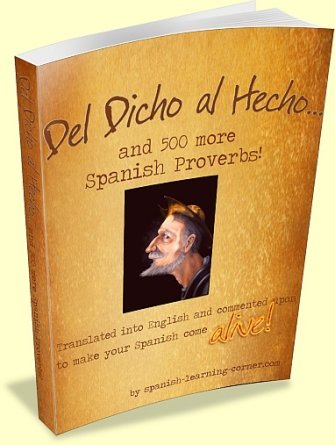Basic Spanish Tenses
Here we'll study when to use each of the basic Spanish tenses. We provide you with the three regular conjugation models which will help you to do the conjugating exercises below.
Regular verbs fall into three groups:
- those ending with "ar"
- those ending with "er"
- those ending with "ir"
The following table shows the conjugation of one model verb for each of the three groups. All the verbs you'll need in the exercises below are regular and belong to one of these three groups.
Tocar, estudiar and caminar, for example, are conjugated like amar.
Beber is conjugated like temer.
Vivir is conjugated like partir.
| presente | imperfecto | pretérito | futuro | condicional | |
|---|---|---|---|---|---|
| yo | amo | amaba | amé | amaré | amaría |
| tú | amas | amabas | amaste | amarás | amarías |
| él, ella | ama | amaba | amó | amará | amaría |
| nosotros | amamos | amábamos | amamos | amaremos | amaríamos |
| ustedesellos, ellas | aman | amaban | amaron | amarán | amarían |
| yo | temo | temía | temí | temeré | temería |
| tú | temes | temías | temiste | temerás | temerías |
| él, ella | teme | temía | temió | temerá | temería |
| nosotros | tememos | temíamos | temimos | temeremos | temeríamos |
| ustedesellos, ellas | temen | temían | temieron | temerán | temerían |
| yo | parto | partía | partí | partiré | partiría |
| tú | partes | partías | partiste | partirás | partirías |
| él, ella | parte | partía | partió | partirá | partiría |
| nosotros | partimos | partíamos | partimos | partiremos | partiríamos |
| ustedesellos, ellas | parten | partían | partieron | partirán | partirían |
Presente
What do you do on Mondays?
This Spanish tense is mostly used to refer to actions that are carried out in the broadly-understood present. Think of your weekly schedule. What do you usually do on each day of the week?
Fill in the missing verbs, in the present tense:
1. Los lunes ________como_______(comer) con mi abuela.
2. Los martes______________________(escribir) cartas.
3. Los miércoles _______________(nadar) en la alberca de la universidad.
4. Los jueves_____________________(cantar) en el coro.
5. Los viernes______________________(estudiar) español.
6. Los sábados _____________________(comer) con toda mi familia.
7. Los domingos_____________________(pasear) en el bosque.
Imperfecto
When I was a little girl...
This Spanish tense is used to refer to actions which were carried out repeatedly over a period of time in the past. If you want to talk about what you used to do when you were a little girl, for instance, this is the tense you need.
Fill in the missing verbs in imperfecto:
Cuando yo era chico...
1. Me subía (subir) a los árboles.
2. Me ________________(mojar) en los charcos.
3. _________________(amar) a mi perro.
4. __________________(tocaba) la flauta.
5. _________________(beber) leche con chocolate.
6. ________________(comer) con las manos.
7. __________________(estudiaba) piano.
8. __________________(caminaba) a la escuela todas las mañanas.
9. _____________(desayunar) pan con mantequilla de cacahuate.
10. _______________(vivir) en las nubes.
Pretérito
What did you do yesterday?
Pretérito is used to refer to actions which were carried out on specific occasions. Imagine you are telling a friend what you did yesterday.
Fill in the missing verbs, in pretérito
your friend: ¿Qué hiciste ayer?
you: Ayer….
1.__Aprendí _(aprender) a preparar pollo al estilo chino.
2. _________________(escuchar) cuartetos de Haydn en el radio.
3. __________________(estudiar) con mi amigo para el exámen.
4. ___________________(subir) el Pico de Orizaba.
5. ___________________ (nadar) dos kilómetros.
6. Me_________________(comprar) un vestido nuevo.
7. _____________________(recibir) una carta de mis padres.
8. ___________________(volar) de México a Miami.
9. __________________(firmar) el contrato.
10. _________________(hablar) dos horas con mi amiga Paulina.
Futuro
What will you do when you grow up?
This Spanish tense is used to refer to actions which will be carried out in the future. Think of yourself as a child imagining what she'll do when she grows up.
Fill in the missing verbs in futuro.
Cuando sea grande...
1.__Escucharé__ _(escuchar) las noticias en el radio, como mi papá.
2._______________________(escribir) libros científicos.
3.__________________(estudiar) medicina.
4.____________________(vivir) en Madrid.
5. _____________________(beber) cerveza.
6.___________________(comer) con tenedor y cuchillo.
7.____________________(fumar) pipa.
8._____________________(recibir) el premio Nóbel.
9.__________________(organizar) una expedición a Marte.
10._____________________(trabajar) de bombero.
Condicional
If I were a rich man...
The Spanish tense Condicional is used to refer to actions which would be carried out if a certain precondition would be met. Think of yourself fantasising what you would do if you were rich. [If you happen to be rich you can think of all the things you would not do if you were poor.]
Fill in the missing verbs in the conditional tense. Read aloud the resulting sentences.
Si yo fuera rico…
1. Comería (comer) caviar todos los días.
2. _____________(vivir) en un castillo.
3. _____________(trabajar) menos y ______________(descansar) más.
4. ______________(viajar) por todo el mundo.
5. Me _______________(comprar) una isla en el Caribe.
6. _______________(desayunar) en restaurante todos los días.
7. ___________________(temer) que lleguen ladrones.
8. _______________(utilizar) mi dinero para ayudar a los pobres.
9. ____________________(volar) en mi helicóptero privado.
10. _________________(firmar) cheques para todos mis amigos.






New! Comments
Have your say about what you just read! Leave me a comment in the box below.